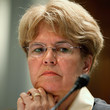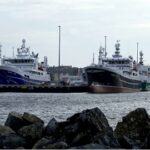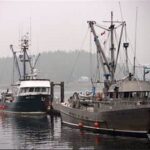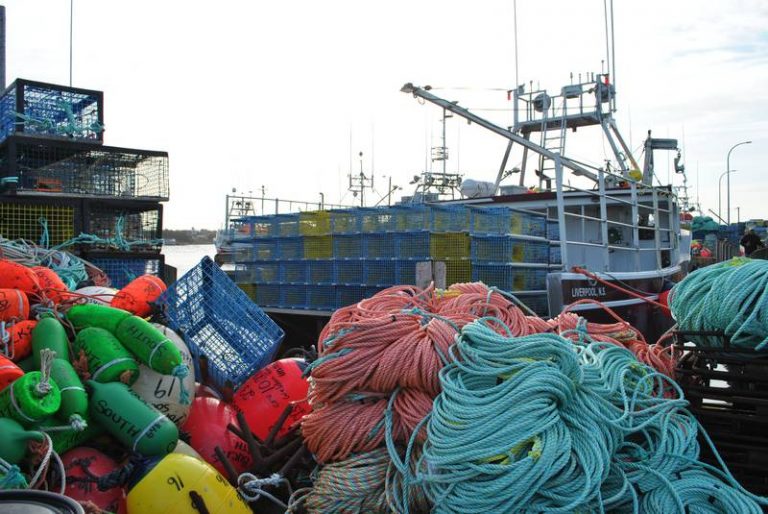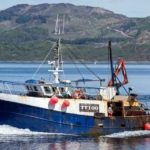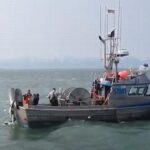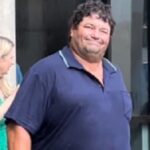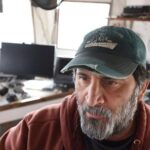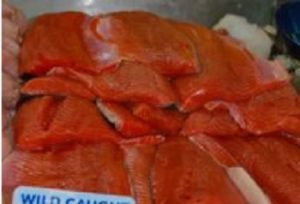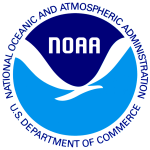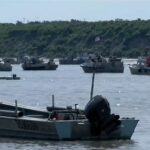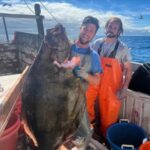Tag Archives: smast
SMAST researchers employ new methods of fish geolocation
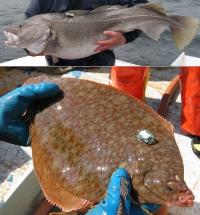 Dr. Geoffrey Cowles and his research assistants, graduate students Doug Zemeckis and Chang Liu, are partners in a multi-institution effort to tag yellowtail flounder, monkfish, and now cod to learn much more than past methods could tell them. Cod are of paramount concern in recent years because NOAA surveys have concluded that they have virtually vanished in the Northeast fishery. Zemeckis said that one of the preliminary findings is that the cod that are there are not migrating north as many believe, but are staying put. Tagged fish are not showing up in Canada, he said. Read the rest here 08:31
Dr. Geoffrey Cowles and his research assistants, graduate students Doug Zemeckis and Chang Liu, are partners in a multi-institution effort to tag yellowtail flounder, monkfish, and now cod to learn much more than past methods could tell them. Cod are of paramount concern in recent years because NOAA surveys have concluded that they have virtually vanished in the Northeast fishery. Zemeckis said that one of the preliminary findings is that the cod that are there are not migrating north as many believe, but are staying put. Tagged fish are not showing up in Canada, he said. Read the rest here 08:31
SMAST professor researches fishing nets to help save juvenile haddock
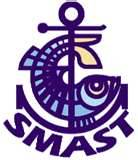 Many commercial fishermen are appalled by regulations that force them to throw undersized fish back into the sea, when they are likely to be already dead. To reduce the unwanted catch of juvenile haddock, professor Pingguo He, a researcher at the UMass Dartmouth School for Marine Science and Technology, has undertaken a project that could adapt a Norwegian net device to the nets used by the fishing industry on Georges Bank. The Norwegian nets have reportedly proved effective in letting juvenile haddock escape the net and have a much better chance of reaching maturity. Read the rest here 07:33
Many commercial fishermen are appalled by regulations that force them to throw undersized fish back into the sea, when they are likely to be already dead. To reduce the unwanted catch of juvenile haddock, professor Pingguo He, a researcher at the UMass Dartmouth School for Marine Science and Technology, has undertaken a project that could adapt a Norwegian net device to the nets used by the fishing industry on Georges Bank. The Norwegian nets have reportedly proved effective in letting juvenile haddock escape the net and have a much better chance of reaching maturity. Read the rest here 07:33
SMAST survey of groundfish has potential to improve regulation
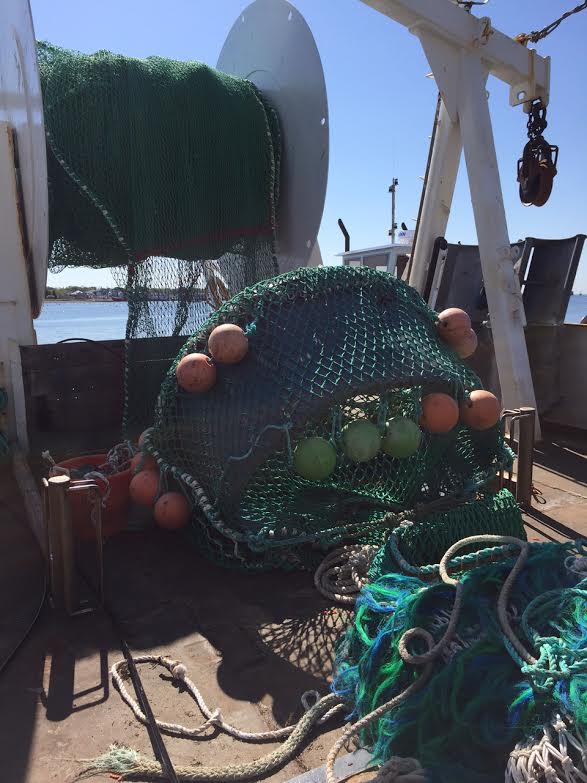 It was May 14, a Thursday. The big yellow Caterpillar roared to life beneath us, throbbing through the steel deck plates; a signal that it was time to cast off the surly bonds of earth. Capt. Ron Borjeson backed the Justice down. The Justice is a scallop boat, but as the net reel above the stern ramp proclaimed, we were rigged for groundfish. But this was to be no ordinary fishing trip. Kevin Stokesbury was heading a scientific expedition, targeting groundfish but trying to count rather than catch them. The flatfish net on the Justice was designed to enable fish to pass through the mouth and escape through the open end unharmed. Their passing would, however, be filmed by cameras mounted inside the net, with their number and species recorded on video and stored for later analysis. Read the rest here 22:52
It was May 14, a Thursday. The big yellow Caterpillar roared to life beneath us, throbbing through the steel deck plates; a signal that it was time to cast off the surly bonds of earth. Capt. Ron Borjeson backed the Justice down. The Justice is a scallop boat, but as the net reel above the stern ramp proclaimed, we were rigged for groundfish. But this was to be no ordinary fishing trip. Kevin Stokesbury was heading a scientific expedition, targeting groundfish but trying to count rather than catch them. The flatfish net on the Justice was designed to enable fish to pass through the mouth and escape through the open end unharmed. Their passing would, however, be filmed by cameras mounted inside the net, with their number and species recorded on video and stored for later analysis. Read the rest here 22:52
UMass researchers win scallop fisheries grants
 SMAST won $373,922 for Dr. Kevin Stokesbury’s continued development of video scallop surveys on Georges Bank. His methods have revolutionized the scallop biomass estimates in recent years, helping turn scallops into the species that keeps New Bedford at the top earning port in the United States for more than a decade. A grant of $160,738 went to Dr. Catherine O’Keefe for further development of a bycatch avoidance system that collects real-time information from fishermen about “hot spots” of yellowtail flounder, which can then be avoided by the scallopers. Read the rest here 08:34
SMAST won $373,922 for Dr. Kevin Stokesbury’s continued development of video scallop surveys on Georges Bank. His methods have revolutionized the scallop biomass estimates in recent years, helping turn scallops into the species that keeps New Bedford at the top earning port in the United States for more than a decade. A grant of $160,738 went to Dr. Catherine O’Keefe for further development of a bycatch avoidance system that collects real-time information from fishermen about “hot spots” of yellowtail flounder, which can then be avoided by the scallopers. Read the rest here 08:34
Fisheries management reform political, says ex-Mayor Scott Lang
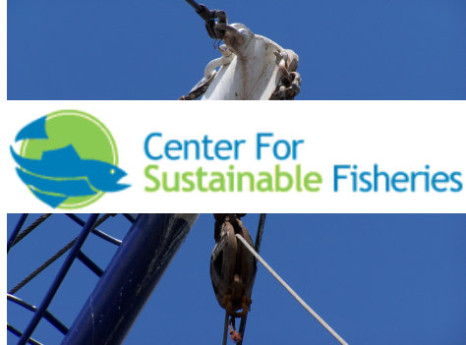 The “middle layer” of the NOAA bureaucracy is not the place to go to seek reforms of a dysfunctional fishery management agency, former Mayor Scott Lang told a meeting of the Center for Sustainable Fisheries Wednesday at the New Bedford Whaling Museum. The theme of the meeting was the worsening problems with NOAA survey trawls in the Gulf of Maine and Georges Bank. Fishermen and scientists from the UMass Dartmouth School for Marine Science and technology traded accounts of wildly different results from government-run survey trawls and those conducted by the fishing boats, including a collaboration with SMAST. Read the rest here 23:25
The “middle layer” of the NOAA bureaucracy is not the place to go to seek reforms of a dysfunctional fishery management agency, former Mayor Scott Lang told a meeting of the Center for Sustainable Fisheries Wednesday at the New Bedford Whaling Museum. The theme of the meeting was the worsening problems with NOAA survey trawls in the Gulf of Maine and Georges Bank. Fishermen and scientists from the UMass Dartmouth School for Marine Science and technology traded accounts of wildly different results from government-run survey trawls and those conducted by the fishing boats, including a collaboration with SMAST. Read the rest here 23:25
Rep. Antonio F.D. Cabral seeks $450,000 for SMAST project
 “SMAST is an innovative leader for fisheries research and I’m proud to have won state funds for SMAST to continue its independent research on groundfish populations,” said Cabral, also in a news release. “At a time when the commercial fishing industry is experiencing unprecedented consolidation, these funds couldn’t be more important. “Right now, NOAA’s data on fish populations is the only information that’s used to set annual catch limits,” Cabral said. “We need independent research and these state dollars will produce it.” Read the rest here 18:55
“SMAST is an innovative leader for fisheries research and I’m proud to have won state funds for SMAST to continue its independent research on groundfish populations,” said Cabral, also in a news release. “At a time when the commercial fishing industry is experiencing unprecedented consolidation, these funds couldn’t be more important. “Right now, NOAA’s data on fish populations is the only information that’s used to set annual catch limits,” Cabral said. “We need independent research and these state dollars will produce it.” Read the rest here 18:55
In the News -SMAST Prof. Emeritus Brian Rothschild Named Hjort Scholar
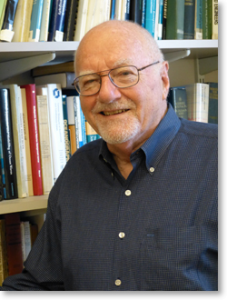 SMAST Prof. Emeritus Brian Rothschild has been appointed a Hjort Scholar by the Hjort Centre for Marine Ecosystem Dynamics, Bergen, Norway. According to the appointment letter, recipients of Hjort Scholarships are “… scientists whose research is deemed to promote scientific innovation and understanding of marine ecosystem dynamics.” He is currently President and CEO of the Center for Sustainable Fisheries (CSF), a science-based, non-profit organization “devoted to the onservation of our fisheries resources and the economic development of our fishing communities.” Read the rest here 12:06
SMAST Prof. Emeritus Brian Rothschild has been appointed a Hjort Scholar by the Hjort Centre for Marine Ecosystem Dynamics, Bergen, Norway. According to the appointment letter, recipients of Hjort Scholarships are “… scientists whose research is deemed to promote scientific innovation and understanding of marine ecosystem dynamics.” He is currently President and CEO of the Center for Sustainable Fisheries (CSF), a science-based, non-profit organization “devoted to the onservation of our fisheries resources and the economic development of our fishing communities.” Read the rest here 12:06
SMAST deploys water glider to study ocean temperatures
 Scientists from the UMass Dartmouth School for Marine Science and Technology drove up to the Fairhaven Shipyard before dawn Tuesday with a bright yellow, 6-foot torpedo-shaped object they call Blue.Blue is something called a marine glider, an autonomous underwater vehicle named after famed solo mariner Joshua Slocum by its manufacturer. Blue is designed to go to sea for weeks at a time to gather information about the water and send it back to scientists. Read the rest here and here 09:45
Scientists from the UMass Dartmouth School for Marine Science and Technology drove up to the Fairhaven Shipyard before dawn Tuesday with a bright yellow, 6-foot torpedo-shaped object they call Blue.Blue is something called a marine glider, an autonomous underwater vehicle named after famed solo mariner Joshua Slocum by its manufacturer. Blue is designed to go to sea for weeks at a time to gather information about the water and send it back to scientists. Read the rest here and here 09:45
To aid fishermen, SMAST professor develops trawl that won’t catch some fish
 Not catching fish is more complicated than catching them these days, but UMass Dartmouth Professor Pinnguo He is hoping to change that with new gear he is developing. “We looked at fish behavior and how they react when they are approached by fishing gear and now are confident our gear can distinguish between the species,” He said. Trawls for groundfish have two major components: Read the rest here 09:02
Not catching fish is more complicated than catching them these days, but UMass Dartmouth Professor Pinnguo He is hoping to change that with new gear he is developing. “We looked at fish behavior and how they react when they are approached by fishing gear and now are confident our gear can distinguish between the species,” He said. Trawls for groundfish have two major components: Read the rest here 09:02
Working Waterfront Festival – Annual blessing, UMass Dartmouth SMAST Recieves Friend of the Fishing Industry award
 James Kendall, of New Bedford Seafood Consulting, also spoke, and presented Offshore Mariners’ Wives Association Friend of the Fishing Industry awards to members of the UMass Dartmouth School for Marine Science and Technology . Kendall said in the past, the award went to key members of SMAST, or “captains.” “This year, we would like to try something a little different. This year we want to acknowledge their mate and crew,” Kendall said, referring to members of SMAST faculty and students. Read the rest here 17:15
James Kendall, of New Bedford Seafood Consulting, also spoke, and presented Offshore Mariners’ Wives Association Friend of the Fishing Industry awards to members of the UMass Dartmouth School for Marine Science and Technology . Kendall said in the past, the award went to key members of SMAST, or “captains.” “This year, we would like to try something a little different. This year we want to acknowledge their mate and crew,” Kendall said, referring to members of SMAST faculty and students. Read the rest here 17:15
Fishing research topic of SMAST meeting with lawmakers
 NEW BEDFORD — UMass Dartmouth Chancellor Divina Grossman will lead a university delegation in a Monday session with lawmakers to emphasize the importance of funding fishing research. Read more here 08:08:
NEW BEDFORD — UMass Dartmouth Chancellor Divina Grossman will lead a university delegation in a Monday session with lawmakers to emphasize the importance of funding fishing research. Read more here 08:08:
Groundfish Recovery and Revitalization Plan Press Release Tomorrow, June 17th at 11am Umass Dartmouth SMAST
 Dear Friends, We just obtained an announcement that tomorrow, June 17th at 11am UMass SMAST will host a press event on its “Groundfish Port Recovery and Revitalization Plan for the Port of New Bedford/Fairhaven.” The Order of Events are as follows: Welcome Remarks from Senator Montigny, Remarks from Mayor Mitchell, Summary of Findings Video of fish count capability, Comments/Questions. The University of Massachusetts Dartmouth, SMAST is located at 706 S Rodney French Blvd, New Bedford, MA 02744. 15:51
Dear Friends, We just obtained an announcement that tomorrow, June 17th at 11am UMass SMAST will host a press event on its “Groundfish Port Recovery and Revitalization Plan for the Port of New Bedford/Fairhaven.” The Order of Events are as follows: Welcome Remarks from Senator Montigny, Remarks from Mayor Mitchell, Summary of Findings Video of fish count capability, Comments/Questions. The University of Massachusetts Dartmouth, SMAST is located at 706 S Rodney French Blvd, New Bedford, MA 02744. 15:51
Watch this interesting video – Steve Cadrin “Optimal Yield from Mixed-Stock Fisheries”
 This is the third speaker of session 2, Steve Cadrin, Associate Professor, Department of Fisheries Oceanography, School for Marine Science and Technology, University of Massachusetts Dartmouth. His talk is titled, “Strengthening the Scientific Basis of the 2006 Management Requirements: Optimal Yield from Mixed-Stock Fisheries” Click here 16:19
This is the third speaker of session 2, Steve Cadrin, Associate Professor, Department of Fisheries Oceanography, School for Marine Science and Technology, University of Massachusetts Dartmouth. His talk is titled, “Strengthening the Scientific Basis of the 2006 Management Requirements: Optimal Yield from Mixed-Stock Fisheries” Click here 16:19
A top NOAA fisheries scientist has proposed dramatic change in yellowtail flounder stock assessments

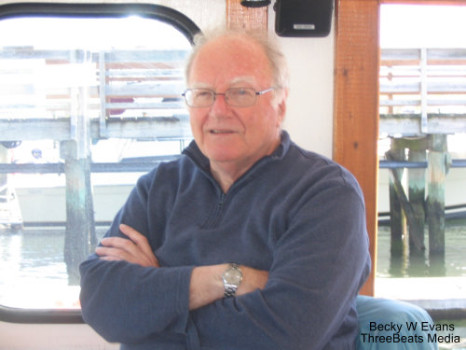 NEW BEDFORD — A top NOAA fisheries scientist has proposed a dramatic change in the way the agency makes its stock assessments for yellowtail flounder. The proposal by Dr. William Karp, director of the Northeast Regional Science Center, embraces the view of Dr. Brian Rothschild, professor emeritus at UMass Dartmouth. It reduces the reliance on statistical models that have proven unreliable and inadequate, instead calling on NOAA to employ additional data and information that it previously wouldn’t consider. Read more@southcoasttoday 19:36
NEW BEDFORD — A top NOAA fisheries scientist has proposed a dramatic change in the way the agency makes its stock assessments for yellowtail flounder. The proposal by Dr. William Karp, director of the Northeast Regional Science Center, embraces the view of Dr. Brian Rothschild, professor emeritus at UMass Dartmouth. It reduces the reliance on statistical models that have proven unreliable and inadequate, instead calling on NOAA to employ additional data and information that it previously wouldn’t consider. Read more@southcoasttoday 19:36
SMAST Findings from “choke species” yellowtail survey bode well for scallopers – Video
![]() Dr. Kevin Stokesbury of the UMass School for Marine Science and Technology said that the eight trawls counted so far from the trip indicate plentiful yellowtail on Georges Bank, which is something that scallopers have contended for years. Stokesbury said that NOAA fisheries estimates were that each of his trawls would yield five to 10 yellowtails. In fact, the SMAST team counted many times that amount, over 300 in one instance. more@southcoasttoday 10:13
Dr. Kevin Stokesbury of the UMass School for Marine Science and Technology said that the eight trawls counted so far from the trip indicate plentiful yellowtail on Georges Bank, which is something that scallopers have contended for years. Stokesbury said that NOAA fisheries estimates were that each of his trawls would yield five to 10 yellowtails. In fact, the SMAST team counted many times that amount, over 300 in one instance. more@southcoasttoday 10:13
Watch out, NOAA: SMAST is innovating again – GO SMAST, GO!!!

Dr. Kevin Stokesbury
Dr. Kevin Stokesbury posed a challenge: How do you count fish in the ocean without killing them, in particular yellowtail flounder? It’s an important question because fishermen simply do not trust NOAA’s survey methods. Many believe fish are severely undercounted because the NOAA researchers on the ship Bigelow don’t seem to know what they are doing when they go fishing. It’s killing the industry. excitedly continued.
Your View: SMAST owes answers to the industry – Attorney Harvey B. Mickelson, general counsel to the American Scallop Association
![]() Regarding your editorial of Feb. 13, “Our View: SMAST poised to bring valuable change,” which began: “One element that will be absolutely necessary on the path to sustainable fisheries is trust, and one that must be absolutely avoided is that one group or person can supply the solution.” I absolutely agree, but what was not defined was — under the current UMass Dartmouth and SMAST leadership — how the seafood industry or anyone else can trust a person or entity that for months has been secretive in its future plans for the fishing industry or in describing any agreements it has negotiated with NOAA, which supposedly sets the tone for SMAST and federal back-scratching for the future. continued
Regarding your editorial of Feb. 13, “Our View: SMAST poised to bring valuable change,” which began: “One element that will be absolutely necessary on the path to sustainable fisheries is trust, and one that must be absolutely avoided is that one group or person can supply the solution.” I absolutely agree, but what was not defined was — under the current UMass Dartmouth and SMAST leadership — how the seafood industry or anyone else can trust a person or entity that for months has been secretive in its future plans for the fishing industry or in describing any agreements it has negotiated with NOAA, which supposedly sets the tone for SMAST and federal back-scratching for the future. continued
Our View: SMAST poised to bring valuable change
 Lohrenz was recently appointed as co-director of the Marine Fisheries Institute, a collaboration between UMass and the state Department of Marine Fisheries, to the chagrin of many supporters of the former co-director, Dr. Brian Rothschild, a man held in high esteem by colleagues around the world, fishermen and this newspaper. Read more here
Lohrenz was recently appointed as co-director of the Marine Fisheries Institute, a collaboration between UMass and the state Department of Marine Fisheries, to the chagrin of many supporters of the former co-director, Dr. Brian Rothschild, a man held in high esteem by colleagues around the world, fishermen and this newspaper. Read more here![]()
Dr. Steven Lohrenz Letter: SMAST puts independent science first
………At the same time, our faculty will continue to grow important research programs in coastal management, sea level rise, climate change, marine renewable energy, ocean sensing technology and other areas that will shape our regional  economy and quality of life.
economy and quality of life.
Anybody who remains skeptical of SMAST’s commitment to high-quality research should consider that we are also moving ahead with a $45 million expansion of SMAST in New Bedford. This is a tangible and transformational investment in the future of one of America’s greatest ports. Read more
SMAST independence shouldn’t be the one that got away – Steve Urbon
 Rothschild, you see, is a frequent critic of NOAA’s scienitfic methods. And while NOAA and environmental groups have given SMAST some grants, there is a fear that too close a relationship with NOAA will stifle criticism and undermine SMAST’s dogged independence. “The bottom line is money,” Mickelson told me. “If they scratch the back of NOAA and get rid of Rothschild, they will have access to money for fisheries education.” Read more
Rothschild, you see, is a frequent critic of NOAA’s scienitfic methods. And while NOAA and environmental groups have given SMAST some grants, there is a fear that too close a relationship with NOAA will stifle criticism and undermine SMAST’s dogged independence. “The bottom line is money,” Mickelson told me. “If they scratch the back of NOAA and get rid of Rothschild, they will have access to money for fisheries education.” Read more
HARVEY B. MICKELSON – UMass administration owes everyone answers on SMAST, the answers to the questions put forth herein must be forthcoming.
Apparently the administration of UMass Dartmouth is not going to respond to my request of having a public dialogue on its future relationship with the fishing industry. Those of us who have engaged in the seafood industry and who lived  through the pre-SMAST years and have an understanding of the impact of SMAST on the domestic fishing industry are entitled to answers. Read more
through the pre-SMAST years and have an understanding of the impact of SMAST on the domestic fishing industry are entitled to answers. Read more
Letter: Complex fisheries need experts like Rothschild – Roy Enoksen
I believe the university needs to tell the public if it will remain an independent fishery school or a rubber stamp for National Marine Fisheries. Removing Brian Rothschild from the Massachusetts Marine Fisheries Institute does not appear to me to be a positive move for the fisheries.Dr. Rothschild, as we all know, is renowned throughout the world in fisheries. The reasons given by the school for his removal (“Fisheries institute revamp removes Rothschild,” Dec. 14) do not add up. Read More

SMAST professor Brian Rothschild, and the SMAST Team are coming to the rescue! (There is a God!) It ain’t NOAA either.
http://www.youtube.com/watch?v=oHSkMwUa2i4
I’m willing to bet my sou’wester that the SMAST Team will get some real results that the industry can believe.
SMAST plans independent groundfish survey to assist groundfishermen By DON CUDDY
DARTMOUTH — Frustrated by doubts surrounding the accuracy of fish stock assessments conducted by NOAA and with the groundfish industry in crisis, UMass Dartmouth’s School for Marine Science and Technology plans to launch an independent survey of groundfish stocks. “(NOAA Fisheries) is saying they don’t have time to review the assessments that are on the table,” said SMAST professor Brian Rothschild. “But this is really high stakes and we need to do something before May 1.” The new fishing year, with cuts of 50-70 percent projected for key stocks, begins May 1. Such drastic cuts threaten to force many independent fishermen out of business.
http://www.southcoasttoday.com/apps/pbcs.dll/article?AID=/20121017/NEWS/210170334
Our View: Fishery managers need management | SouthCoastToday.com
 UMass Dartmouth’s School of Marine Science and Technology, housed in New Bedford’s South End, wrote the book on scallop surveys. SMAST’s peer-reviewed survey data convinced federal regulators the fishery wasn’t collapsing and that closed areas could be opened and managed for sustainability. The school built on a shoestring budget equipment that showed scallop populations were healthy, in contradiction to data gathered by improperly calibrated government equipment. So we ask: Why squeeze SMAST out of the process by cutting its allocation of Research Set-Aside funds from $500,000 to $100,000?
UMass Dartmouth’s School of Marine Science and Technology, housed in New Bedford’s South End, wrote the book on scallop surveys. SMAST’s peer-reviewed survey data convinced federal regulators the fishery wasn’t collapsing and that closed areas could be opened and managed for sustainability. The school built on a shoestring budget equipment that showed scallop populations were healthy, in contradiction to data gathered by improperly calibrated government equipment. So we ask: Why squeeze SMAST out of the process by cutting its allocation of Research Set-Aside funds from $500,000 to $100,000?
http://www.southcoasttoday.com/apps/pbcs.dll/article?AID=/20120831/OPINION/208310302/-1/NEWS01






